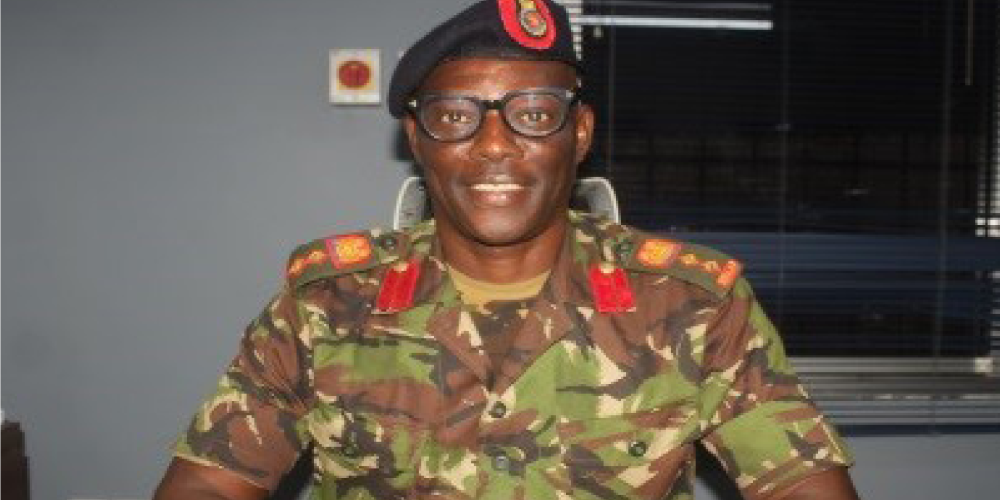Colonel RR Gbondo, Director Armed Forces Endowment & loan Scheme
Expo Magazine
By Colonel RR Gbondo
In a landmark move to redefine the Republic of Sierra Leone Armed Forces (RSLAF) as a self-sustaining institution, Chief of Defence Staff (CDS) Major General Amara Idara Bangura has, within his first 100 days in office, inaugurated the Defence Enterprise Services (DES)—a visionary initiative poised to revolutionize the financial and operational framework of Sierra Leone’s military. This groundbreaking venture underscores the CDS’s commitment to fostering innovation, economic resilience and long-team welfare for personnel, while aligning seamlessly with RSLAF’s ongoing Tri-Service structural reforms.
THE GENESIS OF DES:
A Strategic Blueprint for Autonomy. The DES represents a paradigm shift in how RSLAF manages resources and sustains its operations. Designed to consolidate and optimize RSLAF’s investments, the DES integrates four critical entities under a unified umbrella:
Armed Forces Agricultural Unit (AFELS): Providing financial support to personnel through loans and grants.
- Engineering
Construction Company
(ECC): Leading infrastructure and technical projects.
- Armed Forces
Agricultural Unit (AFAU): Promoting food security and agribusiness.
- Defence Tailoring
Industry (DTI): Producing uniforms and equipment, thereby reducing reliance on external suppliers.
The DES ensures operational synergy while preserving the individual mandates of these units by harmonizing their functions. A robust financial model underpins the initiative, which is supported by seed funding from AFELS, government contracts, and commercial revenue streams.
This diversified approach not only secures capital for expansion but also prioritizes reinvestment into welfare programs, infrastructure, and innovation.
TRI-SERVICE SYNERGY:
DES as a Catalyst for
Modernization
The DES dovetails Military Ties: Partnering with local communities on agricultural and infrastructure projects, spurring job creation.
This alignment with the Tri- Service’s pillars—operational effectiveness, adaptability, and rapid decision-making—positions DES as a cornerstone of RSLAF’s modernization agenda.
CORE VALUES AND
STRATEGIC EXECUTION
Guided by the principles of service, transparency, accountability, and responsibility, the DES operates with a dual mandate: fiscal prudence and ethical governance. Key strategic actions include:
- Legal Frameworks:
Drafting policies to regulate DES operations and ensure compliance.
- Tri-Service Integration: Embedding DES within the new Defence Headquarters structure for coordinated governance.
- Capacity Building:
Training personnel in enterprise management to drivesustainability.
A VISION BEYOND PROFIT: NATIONAL IMPACT Beyond bolstering RSLAF’s autonomy, the DES is a catalyst for national development. By leveraging military expertise in agriculture, engineering, and manufacturing, the initiative will:
- Stimulate Local
Economies: Create jobs and skill-building opportunities for with
RSLAF’s transition to the Tri-Service structure, a strategic overhaul initiated in 2019 to enhance interoperability and agility across Army, Navy, and Air Force domains. Just as the Tri- Service fosters joint operations, the DES amplifies economic resilience by:
- Reducing Fiscal Dependency:
Generating alternative revenue to supplement traditional funding.
- Enhancing Welfare:
Directing profits into housing, healthcare, and education for personnel and families.
Strengthening Civil-Military Ties: Partnering with local communities on agricultural and infrastructure projects, spurring job creation.
This alignment with the Tri- Service’s pillars—operational effectiveness, adaptability, and rapid decision-making—positions DES as a cornerstone of RSLAF’s modernization agenda.
CORE VALUES AND
STRATEGIC EXECUTION
Guided by the principles of service, transparency, accountability, and responsibility, the DES operates with a dual mandate: fiscal prudence and ethical governance. Key strategic actions include:
- Legal Frameworks:
Drafting policies to regulate DES operations and ensure compliance.
- Tri-Service Integration: Embedding DES within the new Defence Headquarters structure for coordinated governance.
- Capacity Building:
Training personnel in enterprise management to drivesustainability.
A VISION BEYOND PROFIT: NATIONAL IMPACTBeyond bolstering RSLAF’s autonomy, the DES is a catalyst for national development. By leveraging military expertise in agriculture, engineering, and manufacturing, the initiative will:
- Stimulate Local
Economies: Create jobs and skill-building opportunities for civilians.
| • Upgrade Infrastructure: Improve barracks, roads, and utilities through ECC projects.
• Enhance Food Security: Expand AFAU’s role in sustainable farming practices. CONCLUSION: A LEGACY OF INNOVATION The CDS’ DES epitomizes transformative leadership. In just 100 days, he has laid the foundation for an RSLAF that is not only a guardian of peace but also an engine of socio- economic progress. As the DES gains momentum, it promises to fortify Sierra Leone’s defence capabilities while uplifting communities—a testament to the CDS’s foresight and dedication to “Service First, Always.” The road ahead is one of collaboration and growth. With the Tri-Service structure as its backbone and the DES as its economic heartbeat, RSLAF is poised to emerge as a model of 21st-century military excellence—resilient, s e l f – reliant, and unwavering in its service to Sierra Leone. For further details on RSLAF’s initiatives, visit: www.mod.gov.sl In Unity and Enterprise, We Thrive. |
Copyright –Published in Expo Magazine, March-April 2025 Edition Vol.3, No.3, (ExpoTimes News – Expo Media Group (expomediasl.com)




